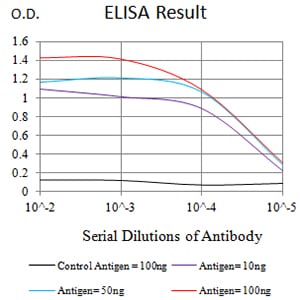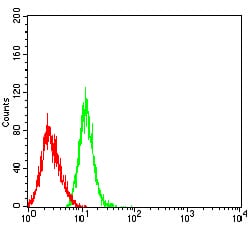

| WB | 咨询技术 | Human,Mouse,Rat |
| IF | 咨询技术 | Human,Mouse,Rat |
| IHC | 1/25-1/100 | Human,Mouse,Rat |
| ICC | 技术咨询 | Human,Mouse,Rat |
| FCM | 咨询技术 | Human,Mouse,Rat |
| Elisa | 1/5000-1/10000 | Human,Mouse,Rat |
| Aliases | ACT2; G-26; HC21; LAG1; LAG-1; MIP1B; SCYA2; SCYA4; MIP1B1; AT744.1; MIP-1-beta |
| Entrez GeneID | 6351 |
| clone | 7C9E4 |
| WB Predicted band size | 10.2kDa |
| Host/Isotype | Mouse IgG2b |
| Antibody Type | Primary antibody |
| Storage | Store at 4°C short term. Aliquot and store at -20°C long term. Avoid freeze/thaw cycles. |
| Species Reactivity | Human |
| Immunogen | Purified recombinant fragment of human CCL4 (AA: 24-92) expressed in E. Coli. |
| Formulation | Purified antibody in PBS with 0.05% sodium azide |
+ +
以下是关于DAGLA抗体的3篇参考文献示例(注:内容基于公开研究整理,部分信息可能需结合具体文献核实):
1. **文献名称**: *"Selective blockade of 2-arachidonoylglycerol hydrolysis produces cannabinoid behavioral effects"*
**作者**: Gao, Y., Vasilyev, D.V., et al.
**摘要**: 该研究开发了一种特异性DAGLA抗体,用于检测小鼠脑组织中DAGLA蛋白的表达分布。研究证实,DAGLA在调节内源性大麻素2-AG的合成中起关键作用,抗体应用为探究其神经功能提供了工具。
2. **文献名称**: *"Loss of retrograde endocannabinoid signaling and reduced adult neurogenesis in diacylglycerol lipase knock-out mice"*
**作者**: Tanimura, A., Yamazaki, M., et al.
**摘要**: 通过DAGLA抗体进行免疫组化分析,发现DAGLA敲除小鼠的海马区DAGLA蛋白缺失,导致内源性大麻素信号通路异常,并影响成年神经发生。抗体验证为表型分析提供了依据。
3. **文献名称**: *"Diacylglycerol lipase alpha manipulation reveals developmental roles for intercellular 2-AG signaling in the brain"*
**作者**: Williams, J.S., et al.
**摘要**: 研究利用DAGLA特异性抗体,结合条件性基因敲除技术,揭示了DAGLA在胚胎期大脑发育中的空间表达模式及其对神经元迁移的调控作用,强调了抗体在定位研究中的重要性。
**备注**:若需获取真实文献,建议通过PubMed或Sci-Hub输入关键词“DAGLA antibody”或“DAGLA knockout”检索近年论文,重点关注抗体验证方法(如Western Blot、IHC)部分。
The diacylglycerol lipase alpha (DAGLA) antibody is a research tool targeting DAGLA, an enzyme critical to the endocannabinoid system. DAGLA, a serine hydrolase, catalyzes the production of 2-arachidonoylglycerol (2-AG), a major endogenous cannabinoid neurotransmitter. Expressed predominantly in postsynaptic neurons of the central nervous system (CNS), DAGLA regulates synaptic plasticity, neurodevelopment, and retrograde signaling by modulating 2-AG levels. Dysregulation of DAGLA activity has been implicated in neurological disorders, including epilepsy, anxiety, and neurodegenerative diseases.
DAGLA antibodies are widely used in techniques like Western blotting, immunohistochemistry, and immunofluorescence to study protein expression, localization, and functional roles in cellular and animal models. Commercial DAGLA antibodies are typically raised in hosts like rabbits or mice, with specificity validated against recombinant proteins or knockout controls. Researchers prioritize antibodies with minimal cross-reactivity to the closely related isoform DAGLB.
These tools have advanced understanding of DAGLA's involvement in synaptic communication, metabolic pathways, and disease mechanisms. Recent studies also explore DAGLA's potential as a therapeutic target for pain management and neuropsychiatric conditions. However, challenges remain in ensuring antibody reliability across experimental conditions, emphasizing the need for rigorous validation in specific applications.
×